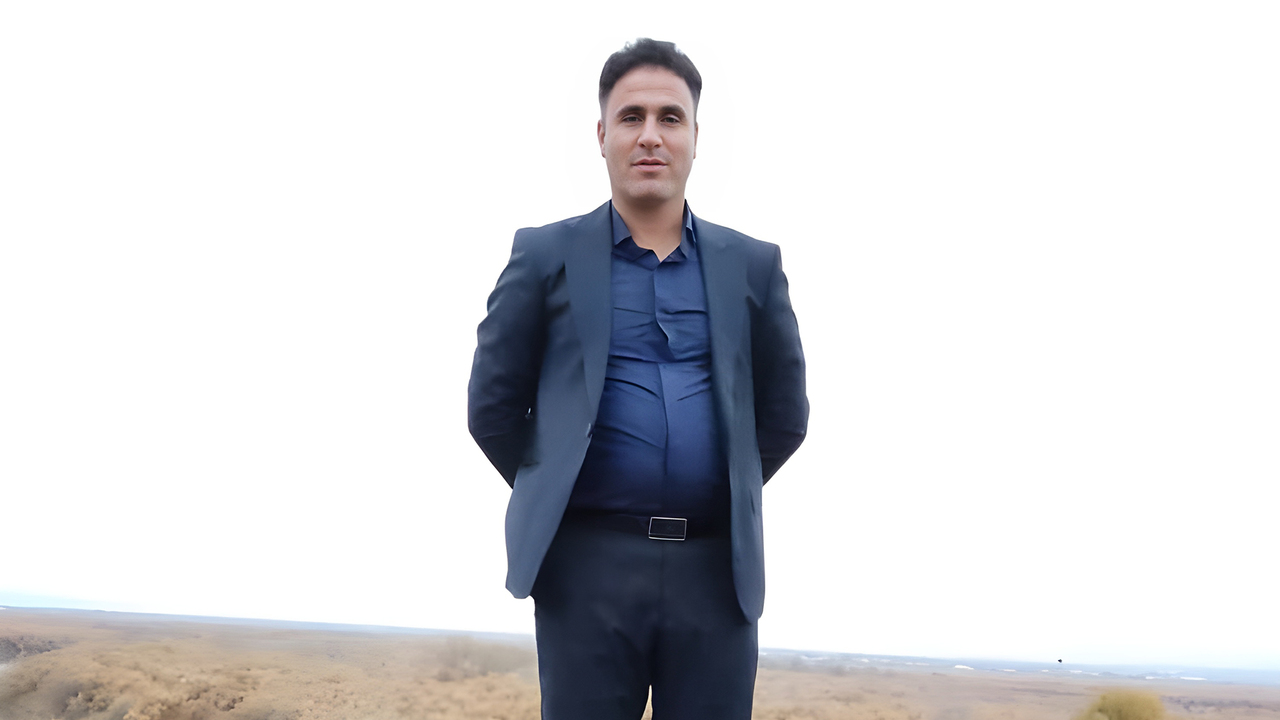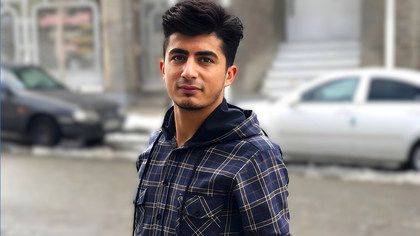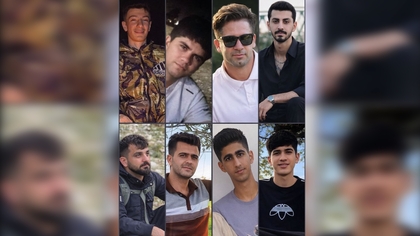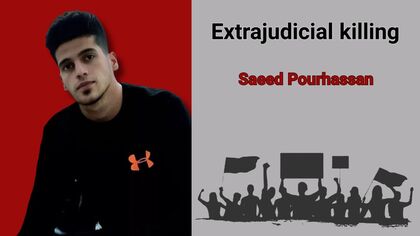Concealment of the planned execution of Hamid Hosseinnezhad Heydranlou; from enforced disappearance of the body to denial of death certificate to the family

As of today, Tuesday, April 29, 2025, nine days after the announcement of the execution of the Kurdish political prisoner "Hamid Hosseinnezhad Heydranlou" by Fars News Agency, affiliated with the Islamic Revolutionary Guard Corps (IRGC), the body of this political prisoner has been subjected to enforced disappearance by the authorities. Judicial authorities have kept the time and place of execution secret and, until now, have refrained from issuing a death certificate or providing any information regarding the burial site to the family.
According to a source informed by Kurdpa, despite the passing of nine days since the announcement of the execution of this Kurdish political prisoner, judicial, security, and administrative authorities have not handed over the body, issued a death certificate, announced a burial location, or presented any proof confirming the execution to the family.
This informed source added that on Friday, April 26, 2025, the Hosseinnezhad family received a phone call from the Urmia Intelligence Office and were summoned to appear on Sunday, April 28, 2025. During this meeting, officials told the family: “Stop looking for the body and go on with your lives.” When the family requested any document or evidence confirming the execution or location of the burial — even just a photo — the security forces refused and declared that the issue of the body should not be raised under any circumstances.
Regarding the death certificate, this source told Kurdpa that the Hosseinnezhad family went to the Civil Registry Office of Chaldoran to obtain it, but were told there had been no order issued to generate such a document. The Civil Registry Office in Urmia also denied responsibility, stating that the issuance of the certificate was the responsibility of the Chaldoran office.
Incomplete announcement of execution by Fars News, threats to family, non-delivery of the body, ban on mourning ceremonies and warning of arrest
After Fars News Agency, affiliated with the IRGC, published the execution news at 10:54 PM on Saturday, April 20, 2025, first on its Telegram channel and later on its website, the body of Hamid Hosseinnezhad Heydranlou was subjected to enforced disappearance by judicial and security authorities. This news agency did not mention the time and place of execution and only claimed that “this issue has been communicated today to the Hosseinnezhad family by the responsible authorities of West Azerbaijan Province.” After the news was published, the Revolutionary Court of Urmia contacted the Hosseinnezhad family and informed them of the execution. However, the news agency did not address the issue of the body or the fact that it was not delivered to the family.
In line with this judicial-security concealment, security officers of the Urmia Intelligence Office told the Hosseinnezhad family after the news was published by Fars News: “Go on with your lives, there is no body,” and “you do not have the right to hold a mourning ceremony.” Accordingly, the family returned to their hometown of Chaldoran to hold a private mourning ceremony.
According to informed sources who spoke to Kurdpa, after the execution announcement, the Hosseinnezhad family was placed under strict surveillance and pressure by security agencies to prevent the organization of any mourning ceremonies. Additionally, they were banned from publishing obituary notices, a customary practice in Iran. As a result, the memorial ceremony for Hamid Hosseinnezhad Heydranlou was held privately under security threats and was closed to public participation.
These informed sources further stated that after returning to Chaldoran, the family was repeatedly threatened not to hold any public mourning. Moreover, several family members, including Ronahi Hosseinnezhad, the eldest daughter of Hamid, were threatened with arrest for publishing a video demanding justice.
Evidence suggesting the execution was secretly carried out on the officially notified date
Based on Kurdpa’s findings, the execution of Hamid Hosseinnezhad Heydranlou was likely carried out on Thursday, April 18, 2025, as per the schedule officially communicated by Branch 9 of the Criminal Sentences Enforcement Court of the General and Revolutionary Court of Urmia in Urmia Central Prison. This information was confirmed by several internal sources affiliated with Urmia Prison and the IRGC.
On the evening of Wednesday, April 17, 2025, sources told Kurdpa that two ambulances entered Urmia Prison, which coincided with the Hosseinnezhad family's protest in front of the prison gates. Additionally, on Friday, April 19, 2025, several family members of the eight IRGC border guards who were killed in the same incident immediately published stories on their Instagram accounts, indirectly confirming the execution.
From the Family’s Pursuit of Justice to the Islamic Republic’s Strategy of Deception and Concealed Execution: The Case of Hamid Hosseinnezhad Heydranlou
On May 16, 2025, the execution order of Hamid Hosseinnezhad Heydranlou was formally delivered via Iran’s online judicial notification system (Sana) to his attorney. The notice, issued by Branch 9 of the Criminal Enforcement Office of the Public and Revolutionary Prosecutor's Office of Urmia, declared that the execution would be carried out on April 17, 2025. Concurrently, this Kurdish political prisoner was transferred to solitary confinement, while neither his family nor his lawyer were informed about their right to a final visit.
Fearing for his fate and receiving no information from authorities, the family began a sit-in protest outside Urmia Prison on April 16, 2025. Simultaneously, Ronahi Hosseinnezhad, his daughter, who had previously published a video appealing for her father’s life, released another video expressing deep concern. One of Hamid’s brothers attempted suicide by ingesting toxic substances. These events triggered widespread domestic and international reactions to the looming execution.
Eventually, the family’s continued presence outside the prison led to a brief final visit with Hamid on the afternoon of April 16, 2025. After this, they resumed their sit-in, demanding a review of the case based on exculpatory evidence and calling for the cancellation of what they saw as an unjust death sentence, reiterating Hamid's innocence.
Later that day, military and security forces attempted to disperse the family outside the prison. Meanwhile, Peyman Khanzadeh, the warden of Urmia Prison, and the Urmia Prosecutor met with the family and made conflicting statements. The warden claimed that the Intelligence Department had taken custody of Hamid, stating: “We don’t know where they took him; the file is now in the hands of Intelligence.” The prosecutor told the family he had not signed the execution order and that a review session would be held. However, no written order or official documentation was presented to the family or legal counsel, despite both officials verbally admitting they knew Hamid was innocent.
From April 16 to April 20, 2025, the family maintained their five-day sit-in outside Urmia Prison with no knowledge of Hamid’s fate—whether he was still in prison, had been transferred to the Intelligence Office, or had been executed. Both the prison warden and prosecutor continued to tell the family that “we know Hamid is innocent”, yet failed to issue any written orders, and denied knowledge of his whereabouts.
On April 17, the family continued their protest. One family member was told by prison staff that the prosecutor had requested clemency for Hamid. Yet, the family remained gravely concerned about possible forced confessions and the real possibility that the execution had already been carried out.
On the same day, the family received an eight-second phone call in Persian, allegedly from Hamid, in which he briefly asked them to follow up on his case. The call was abruptly disconnected. The family, however, later stated they could not be certain that the caller was indeed Hamid, as his voice and tone were noticeably different.
Also on this day, Othman Mozayan, one of Hamid’s lawyers, posted the official Sana notice of the execution order on Instagram, confirming that while the date of execution had been officially set, it had not yet been carried out and that Hamid had recently made brief contact with his family.
At 1:00 AM on April 18, 2025, the IRGC-affiliated Fars News Agency released a five-minute video of Hamid’s forced confessions. In response, Ronahi Hosseinnezhad, Hamid’s daughter, published a video denouncing the confessions as extracted under torture and prolonged solitary confinement. She revealed that she herself had been interrogated and threatened by Intelligence agents, who coerced her to falsely state that her father had been separated from them in Turkey.
That same day, Hamid’s mother and other family members gathered outside the Urmia Revolutionary Court, weeping and pleading for access. Security forces, however, prevented them from entering the building and denied them any meeting with the case judge. Although they managed a brief meeting with the prosecutor, he offered only verbal assurances and no formal documentation regarding the case’s status.
On April 19, 2025, the family returned for a fourth consecutive day of sit-in, still with no official information. The prison, court, and prosecution office remained silent in the face of repeated appeals from the family and the defense attorney.
By April 20, 2025, during the fifth day of protest, amid total silence from authorities, a prison official threatened to arrest Ronahi, telling her, “You’ll be here soon too.” She had already received phone threats from the IRGC in Chaldoran, warning her, “Come back to Chaldoran and see what happens.”
That night, at 10:54 PM, Fars News Agency officially published the execution news on its Telegram channel (and the following day on its website), confirming the implementation of the death sentence.
According to Kurdpa’s sources, during these five days, the family made multiple attempts to enter the Urmia Revolutionary Court, but were consistently denied access, with officials claiming: “Orders from Tehran state that no one bearing the surname Hosseinnezhad Heydranlou is permitted entry.” They also repeatedly approached the prison warden and the prosecutor, both of whom reiterated that Hamid was innocent. The warden claimed he had no knowledge of Hamid’s whereabouts, saying that the Intelligence Office had taken him away. The prosecutor also stated the case was under review, but again, no official letter or directive was shown to the lawyer or the family.
During these five days, as the imminent threat of Hamid Hosseinnezhad Heydranlou’s execution gained widespread media attention and the family intensified their efforts to halt the unjust death sentence and demanded a judicial review of the case, numerous reports were published highlighting the unfair trial proceedings and evidentiary inconsistencies.
During this period, Kurdpa published a series of detailed reports, including the following:
"The Imminent Execution of Hamid Hosseinnezhad Heydranlou within 48 Hours": His transfer to solitary confinement, deprivation of legal defense opportunities, and the family’s complete lack of information.
"The Judges Behind the Death Sentence of Hamid Hosseinnezhad Heydranlou": Including Qasem Mazinani (Chief Justice of Branch 9 of the Supreme Court) and Reza Najafzadeh (Presiding Judge of Branch 1 of the Urmia Revolutionary Court).
"Silenced Documents, A Voice Cut Off": Final efforts by Hamid Hosseinnezhad and the current cries for justice by his family.
"A Witness Testimony Documenting Hamid Hosseinnezhad’s Presence in Turkey": A key question raised—did the judiciary ignore this exculpatory evidence?
"The Supreme Court’s Rejection of Hamid Hosseinnezhad’s Appeal": His defense statements contradicted the coerced confessions and state-constructed security narrative.
"An Account of Torture and Forced Confessions by Hamid Hosseinnezhad Heydranlou".
Compiled and translated by Awin Mostafazade



